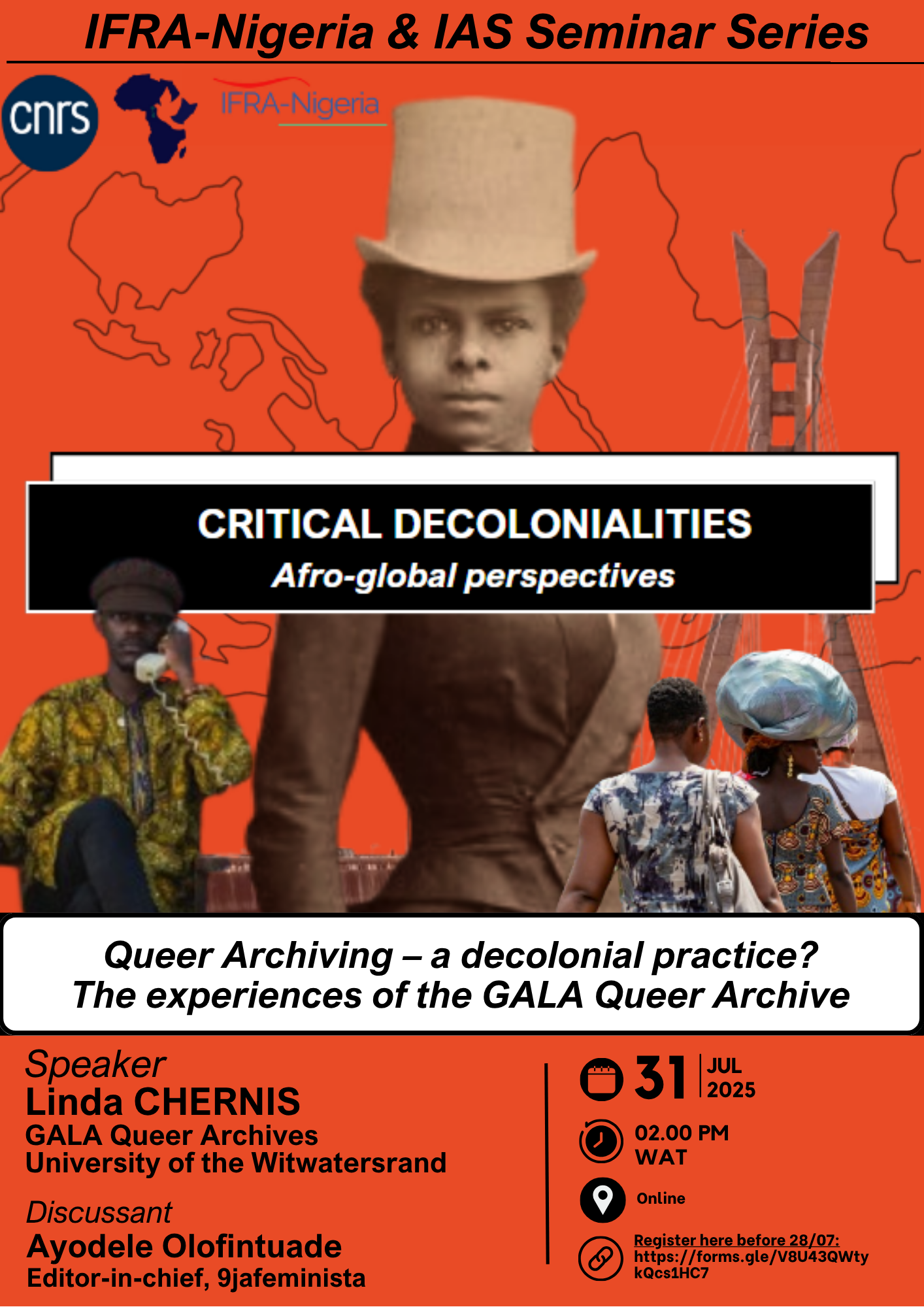Critical Decolonialities “Queer Archiving - a decolonial practice? The experiences of the GALA Queer Archive” with Linda Chernis
 On 31 July, the Institute of African Studies (IAS) of the University of Ibadan and IFRA-Nigeria organized the fourth session of the Critical Decolonialities Seminar on the topic of “Queer Archiving – a decolonial practice? The experiences of the GALA Queer Archive”. Professor Sola Olorunyomi, director of IAS, and Dr Barbara Morovich, Director of IFRA-Nigeria, introduced the two speakers. Linda Chernis is an archivist at the GALA Queer Archive, an organization dedicated to the preservation, production and dissemination of LGBTQIA+ people in South Africa. Ayodele Olofintuade is a writer and editor-in-chief of 9jafeminista an online blog focusing on feminist and queer issues in Nigeria.
On 31 July, the Institute of African Studies (IAS) of the University of Ibadan and IFRA-Nigeria organized the fourth session of the Critical Decolonialities Seminar on the topic of “Queer Archiving – a decolonial practice? The experiences of the GALA Queer Archive”. Professor Sola Olorunyomi, director of IAS, and Dr Barbara Morovich, Director of IFRA-Nigeria, introduced the two speakers. Linda Chernis is an archivist at the GALA Queer Archive, an organization dedicated to the preservation, production and dissemination of LGBTQIA+ people in South Africa. Ayodele Olofintuade is a writer and editor-in-chief of 9jafeminista an online blog focusing on feminist and queer issues in Nigeria.
Watch the full seminar on YouTube: https://youtu.be/OeaYsbKJt-4
Linda Chernis began by introducing the GALA Queer Archives: created in 1997, their initial goal was to ensure that queer history wouldn't be forgotten, as the newly born South African democracy was carrying out a large-scale plan to build or rebuild museums and their narratives. It quickly outgrew its position as a university program and became an independent non-profit organization. The archives are open to everyone, not just academics, to include a larger definition of research. It also has a library which doubles as a community safe space for students at the University of Witwatersrand (Johannesburg) where it is located.
They aim to challenge the notion that homosexuality is not African, arguing, as many scholars have, that it is rather homophobia that is a direct legacy of colonialism. The GALA archives hold over 200 collections, mostly South African but also of a few other African countries, from personal, public and organizational sources. They have also worked to extend their definition of archives by including ephemeras (poster, postcards, flyers etc.).
The GALA Queer Archives is also constantly questioning who and what is archived. Indeed, most of the archives of the first liberation movements in the 90s are from mostly white organizations. They are actively trying to include more diversity, by looking for black queers, trans people and rural gays voices. As the world has gone more digital and more people are documenting their own lives, the archive is also grappling with the increasing amount of material and how to decide what gets archived.
Aware of the criticism of archives as extractivist and are looking for ways to counter this by using more inclusive language and by giving people their own voices back. One key related feature of GALA is their work of archiving the present, meaning documenting queer lives and during current events. The first project took place during the "fees must fall" movement, during which they interviewed queer activists. Today, they are working on the impact of the USAID withdrawal on LGBTQIA+ health.
The archive is also looking to disseminate queer stories, including through Queer Activism in Africa anthology series, created in collaboration with Taboom Media and freely available on their website. Recognizing that language is strongly linked to issues of power, they have progressively tried to translate their stories outside of English, and their latest publications are also available in French, Portuguese, Swahili and Arabic. To further broadcast queer voices, GALA launched Queer Catalyst, an animation workshop in which students bring to life these stories.
Finally, she mentioned the Kewpie collection, the personal photographs of a Johannesburg District 6 hairdresser and drag performer. This collection was exhibited at the District 6 Museum and demonstrates the value of personal queer archive. It also inspired the creation of Salon Kewpie, an independent collective that uses her archives for experimental artistic practices.
Ayodele Olofintuade responded to Linda Chernis' presentation by broaching questions of the connection between indigeneity and queerness, the role of the body, and the need to perceive queer people beyond a hero / victim binary.
Finally, the seminar concluded with a Q&A session on the topics of archiving the activists and their oppressors, the governance structure of the GALA Queer Archive, the role of storytelling and potential queer archives in Nigeria.

Social Media
Mailing List